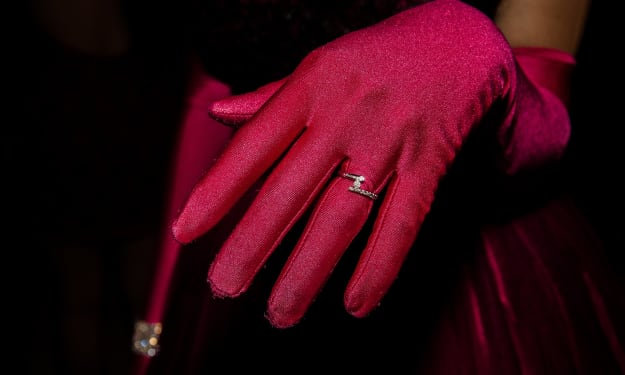Run for Your Life
Abuse, Coronavirus, and the Exercise That Saved Me

Is it me, or does every runner have a traumatic backstory about how running saved their lives?
I’d tried to leave him once after discovering he’d been cheating on me with multiple women. Friends of mine, actually.
Unfortunately, this discovery came just after I’d put all of my savings into a downpayment for the new house we’d moved into together only weeks before. This mocking symbol of my entrapment was located almost an hour away from my entire support network.
The one saving grace from my isolation was the running trail that led directly from my neighborhood to the local park.
Running on Eggshells
By the time the first COVID-19 lockdown descended in March 2020, I’d already been a prisoner in my own home for years. I’d spent roughly 4 years so far under the thumb of my abuser: a violent, gun-obsessed, ex-military alcoholic in denial of his untreated PTSD.
At the time, we both worked as police officers for different cities. The crooked department where he worked was a haven for bad officers who’d been cast out of other agencies for their violent, bigoted, and criminal behavior.
One day, I plan to write about what he did to end up working for that department, but I’m not quite there yet.
WHO Run the World?: The Public Health Crisis of Isolation
As the pandemic cast its bleak shadow over the world, rates of domestic violence soared.
Increased stress stemming from fear, isolation, job loss, and an uncertain future provided added fuel for those with abusive tendencies to unleash their pain on their partners. Mental health issues and substance use escalated, worsening already dire conditions.
Isolation from work, school, and loved ones left countless victims trapped and alone with their tormentors. Injuries that may have normally been noticed went unseen, wounds and torment hidden from view.
I can both personally and professionally confirm these things to be true.
For months, I interacted with almost no one face-to-face (unmasked) other than my abuser. Between his violence, threats, and manipulations; and the ongoing public health crisis I was forced to bear witness to each day at work, I was far too afraid to risk getting close to anyone.
The thick fog of learned helplessness and burnout left me worryingly low for weeks on end.
Running on Lonely
Systemic issues that were already emergent doubled in urgency during the pandemic as mental health outcomes plummeted.
As the community relations officer for my department, I spent most of that period checking in on our most vulnerable and lonely populations, answering calls for mental health crises, and working with nonprofits to deliver badly-needed resources when we could find them. I was also regularly pulled back to patrol to cover the dwindling manpower when other officers got sick or exposed.
It felt gratifying to be of genuine help in a time of such fear and loss, however, it was incredibly draining to go from constant tragedy (and misogyny) at work to the hell that awaited me at home.
Run for Cover
As the pandemic’s grip tightened, the walls of our shared house closed in, smothering any semblance of independence. My world shrank to the confines of our shared space.
My every move was tracked by his paranoid gaze. There was no privacy; I literally was not permitted to be alone in a room for more than a few minutes. If I smiled at something on my phone, he demanded to see my screen, immediately assuming I was sleeping around. He’d break focus only to pass out drunk or to scream at the strangers he played video games with online.
In this stifling atmosphere, my only escape was found by throwing myself into the one activity where I knew he wouldn’t follow me.
Runaway Love
Running outside was the only time I could be alone, unburdened by my abuser’s overbearing presence. I wasn’t particularly fast, but as each satisfying slap of shoes on the pavement carried me further from that house, I found myself able to think a little more clearly. The fog began to dissipate. My runs became the precious interval when I could reclaim my autonomy, however fleeting.
Beyond simple physical exercise, running became a symbol of defiance and of my will to survive. It was during those rare moments alone that I rediscovered the strength and will for self-preservation to imagine a future untethered from the chains of abuse.
It was during a run that I first found the courage to call and share with one of my dearest friends how terrified I was that I wouldn’t make it out of my relationship alive. I was careful to delete evidence of conversations like this before returning home.
My wariness that even this small freedom would be restricted weren’t unfounded. More than once, after deciding I’d been gone for too long, my abuser would drive around looking for me. He didn’t call or text first; he was very ‘stalk first, make up some bullshit about how it was for my protection later’.
While it’d be several more months before I was able to finally free myself from my abuser (using a safety plan I’d created with the help of my therapist and loved ones), I have running to thank for getting me started. Not only did the exercise help me stay active and focused during a time of extreme stress, but it also served as a seemingly-innocuous excuse to leave home alone to plan my escape.
Ready to Run
We don’t see the effects of exercise immediately. Strength builds slowly and painstakingly over time, an investment in your future self. Committing to regular exercise is committing to the belief that you’ll still be around to reap those benefits.
While I couldn’t physically overpower my abuser, running helped me see that there were other ways to reclaim my freedom. It was an act of defiance against the erasure of my identity.
Each stride was a solid reminder I was still on this earth, that I was strong and capable of hard things. As my muscles and endurance grew, so did my motivation to escape.
So, is it a coincidence that so many runners bear tales of trauma? Perhaps not. Running, with its primal simplicity and empowering rhythm, is a mirror reflecting our strength and will to reclaim our lives.
Subscribe in one click to receive your FREE digital copy of my new guided journal, “Empower and Heal: 90 Days of Transformational Prompts for Trauma Recovery, Self-Discovery, and Growth”, delivered straight to your inbox!
Veronica Wren Trauma Recovery Book Club
The Bright Side Running Club — Josie Lloyd
This post may contain affiliate links. This just means if you click a link and decide to make a purchase, I’ll earn a few extra pennies to support my book-buying habit (and do an elaborate, celebratory dance around my apartment just for you). My promise to you is that I’ll only ever recommend resources I truly believe in and have found beneficial in my healing journey. Happy reading!
About the Creator
Veronica Wren
Trauma sucks. Recovery shouldn't. Subscribe here for your FREE exclusive guided journal
❤️🩹 bio.link/veronicawren ❤️🩹
Domestic Abuse & CPTSD Recovery Coach






Comments
There are no comments for this story
Be the first to respond and start the conversation.